CHANS-Net Newsletter -- July 2013
Table of Contents
Table of Contents
- 2013 CHANS Fellows follow "sustainable pathways" to network and learn
- Telecoupling featured at ESA Annual Meeting
- CHANS-Net events at 98th ESA Annual Meeting
- Telecoupling pulls pieces of sustainability puzzle together
- Rocks, water, air, space... and humans: a recipe for AGU success
- Surveys look at CHANS training, research questions
- CHANS-Net members gear up for AGU again
- A mountain of a scientific confab in Minneapolis
2013 CHANS Fellows follow “sustainable pathways” to network and learn
Nine outstanding junior scholars studying coupled human and natural systems will have a unique opportunity to interact and network with scientific thought leaders at the 2013 Annual Meeting of the Ecological Society of America (ESA) in August as part of the CHANS Fellows program.
All the fellows will present at the ESA Annual Meeting, the theme of which is “Sustainable Pathways: Learning from the Past and Shaping the Future.”
"Some junior scholars who are interested in research on the interconnectedness between natural and human systems may not be able to attend conferences and other professional events without financial assistance," said Jianguo "Jack" Liu, principal investigator of CHANS-Net. “The Fellows Program was created by CHANS-Net with support from the National Science Foundation to help these promising scientists connect with other researchers at a prominent national event.
“Offering these networking opportunities will help the fellows become the next leaders in human and natural systems research, education and application,” said William McConnell, co-principal investigator.
The 2013 CHANS Fellows are:
- Jennifer Costanza
- Steve Davis
- Kristina Hopkins
- Abigail Lynch
- Heidi Peterson
- Andrew Rayburn
- Sadie Ryan
- Stephen Wood
- Wu Yang
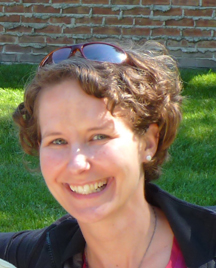 Jennifer Costanza, research associate at North Carolina State University, is interested broadly in the intersection between landscape ecology and conservation biology, and has expertise in the interactions among land management, ecological processes and conservation decisions. Specifically, she’s interested in how land use and land management decisions can lead to sustainable landscapes under future anthropogenic threats such as changing climate and increasing bioenergy demand and future climate change. Costanza uses a multidisciplinary approach, combining social science techniques with ecological models and spatial analysis tools. She’s currently using landscape dynamics simulation models to project the effects of climate change and bioenergy demand scenarios on future land use and wildlife habitat in the southeastern United States.
Jennifer Costanza, research associate at North Carolina State University, is interested broadly in the intersection between landscape ecology and conservation biology, and has expertise in the interactions among land management, ecological processes and conservation decisions. Specifically, she’s interested in how land use and land management decisions can lead to sustainable landscapes under future anthropogenic threats such as changing climate and increasing bioenergy demand and future climate change. Costanza uses a multidisciplinary approach, combining social science techniques with ecological models and spatial analysis tools. She’s currently using landscape dynamics simulation models to project the effects of climate change and bioenergy demand scenarios on future land use and wildlife habitat in the southeastern United States.Costanza will present her paper “Landscape impacts of potential biofuel production scenarios in North Carolina” on Wednesday, Aug. 7 at 9 a.m. in M100HC, Minneapolis Convention Center.
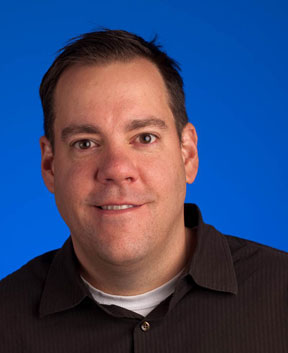 Steve Davis is assistant professor of earth system science at the University of California-Irvine. At UCI and previously as a post-doc at the Carnegie Institution of Washington's Department of Global Ecology, his research has focused on carbon emissions embodied in international trade, the commitment to future warming represented by existing energy infrastructure, and the climate benefits of agricultural intensification. Davis received his doctorate in geological and environmental science from Stanford University in 2008. Before Stanford, he earned a law degree at the University of Virginia and spent a few years practicing corporate law in Silicon Valley.
Steve Davis is assistant professor of earth system science at the University of California-Irvine. At UCI and previously as a post-doc at the Carnegie Institution of Washington's Department of Global Ecology, his research has focused on carbon emissions embodied in international trade, the commitment to future warming represented by existing energy infrastructure, and the climate benefits of agricultural intensification. Davis received his doctorate in geological and environmental science from Stanford University in 2008. Before Stanford, he earned a law degree at the University of Virginia and spent a few years practicing corporate law in Silicon Valley.Davis will present the symposium “Telecoupled CO2 emissions: Implications of the growing dependence on internationally traded carbon” on Thursday, Aug. 8 at 10:40 a.m. in M100EF, Minneapolis Convention Center.
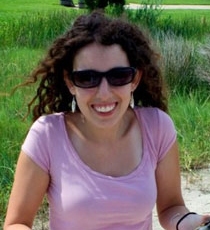 Kristina Hopkins is a doctoral candidate in the Department of Geology and Planetary Science at the University of Pittsburgh. Rivers and streams in urban areas are often polluted and seen as eyesores to local residents. However, these aquatic environments have the potential to provide cities with valuable benefits such as recreation, flood control and clean drinking water. Hopkins’ research examines how urbanization alters hydrology and evaluates methods to reduce the impacts of development on waterways through green practices that soak up and store storm water. She uses historical datasets to reconstruct long-term land use change in watersheds throughout the United States and stream flow records to assess changes in water cycling.
Kristina Hopkins is a doctoral candidate in the Department of Geology and Planetary Science at the University of Pittsburgh. Rivers and streams in urban areas are often polluted and seen as eyesores to local residents. However, these aquatic environments have the potential to provide cities with valuable benefits such as recreation, flood control and clean drinking water. Hopkins’ research examines how urbanization alters hydrology and evaluates methods to reduce the impacts of development on waterways through green practices that soak up and store storm water. She uses historical datasets to reconstruct long-term land use change in watersheds throughout the United States and stream flow records to assess changes in water cycling.Hopkins will present her poster “Characterizing hydrologic alternations following urbanization through time and across space among U.S. cities” on Wednesday, Aug. 7 at from 4:30 to 6:30 p.m. in Exhibit Hall B, Minneapolis Convention Center.
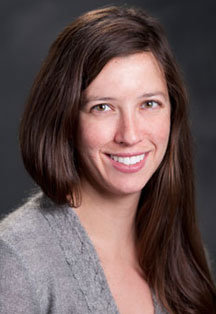 Abigail Lynch, doctoral candidate in the Department of Fisheries and Wildlife at Michigan State University, is a University Distinguished Fellow and a member of the Center for Systems Integration and Sustainability. Lynch is designing a decision-support tool for harvest management of Great Lakes lake whitefish (Coregonus clupeaformis) in a changing climate. Ultimately, she aims to conduct fisheries research, teaching, and outreach with a CHANS approach. She hope to have the greatest impact on the field through advocating for more effective management strategies to preserve fisheries resources for human benefit while protecting the ecological function that fish provide to their ecosystems.
Abigail Lynch, doctoral candidate in the Department of Fisheries and Wildlife at Michigan State University, is a University Distinguished Fellow and a member of the Center for Systems Integration and Sustainability. Lynch is designing a decision-support tool for harvest management of Great Lakes lake whitefish (Coregonus clupeaformis) in a changing climate. Ultimately, she aims to conduct fisheries research, teaching, and outreach with a CHANS approach. She hope to have the greatest impact on the field through advocating for more effective management strategies to preserve fisheries resources for human benefit while protecting the ecological function that fish provide to their ecosystems.Lynch will present her paper “Designing a CHANS decision-support tool for harvest management of Great Lakes lake whitefish (Coregonus clupeaformis) in a changing climate” on Friday, Aug. 9 at 8:20 a.m. in L100D, Minneapolis Convention Center.
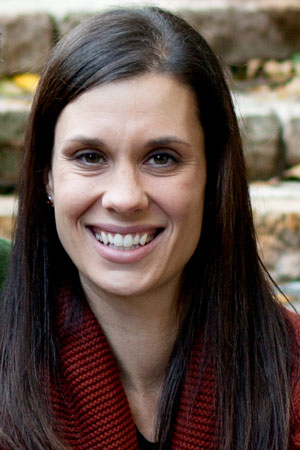 Heidi Peterson, post-doctoral research associate in the Department of Bioproducts and Biosystems Engineering at the University of Minnesota, is part of the Twin Cities Household Ecosystem Project. Her current research links agricultural and urban systems to identify nutrient inefficiencies within the holistic food chain. Phosphorus is a non-renewable resource, essential for agriculture and human food production, which is being depleted rapidly within the United States and more slowly globally. Dietary choices made within urban households ultimately affect the entire system’s nutrient flux, beginning upstream at the farm and eventually downstream contributing to the impairment of our water resources. The objective of her work is to identify barriers or potential for increasing phosphorus use efficiency between agricultural and urban systems. Becoming more efficient in the nutrient transfer within the farm to city cycle reduces the potential for excess nutrients to enter waterways, contributing to eutrophication and hypoxia.
Heidi Peterson, post-doctoral research associate in the Department of Bioproducts and Biosystems Engineering at the University of Minnesota, is part of the Twin Cities Household Ecosystem Project. Her current research links agricultural and urban systems to identify nutrient inefficiencies within the holistic food chain. Phosphorus is a non-renewable resource, essential for agriculture and human food production, which is being depleted rapidly within the United States and more slowly globally. Dietary choices made within urban households ultimately affect the entire system’s nutrient flux, beginning upstream at the farm and eventually downstream contributing to the impairment of our water resources. The objective of her work is to identify barriers or potential for increasing phosphorus use efficiency between agricultural and urban systems. Becoming more efficient in the nutrient transfer within the farm to city cycle reduces the potential for excess nutrients to enter waterways, contributing to eutrophication and hypoxia.Peterson will present her paper “Quantifying the upstream flux of phosphorus to Minnesota’s Twin Cities urban food-shed” on Wednesday, Aug. 7 at 2:50 p.m. in M100HC, Minneapolis Convention Center.
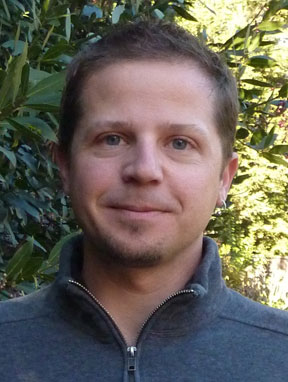 Andrew Rayburn is a restoration ecologist and postdoctoral fellow at the University of California-Davis. Rayburn’s current research focus is the application of spatial and agricultural science to support habitat restoration efforts in working landscapes of central California. He is part of an interdisciplinary team of scientists conducting stakeholder-driven research on reducing restoration costs, improving restoration success and quantifying restoration effects on key ecosystem services. The primary focus of the research team is rangeland ecosystems, which represents complex CHANS in which conservation goals must be balanced against economic realities associated with commodity production.
Andrew Rayburn is a restoration ecologist and postdoctoral fellow at the University of California-Davis. Rayburn’s current research focus is the application of spatial and agricultural science to support habitat restoration efforts in working landscapes of central California. He is part of an interdisciplinary team of scientists conducting stakeholder-driven research on reducing restoration costs, improving restoration success and quantifying restoration effects on key ecosystem services. The primary focus of the research team is rangeland ecosystems, which represents complex CHANS in which conservation goals must be balanced against economic realities associated with commodity production.Rayburn will present his paper “Spatial methods for low-cost restoration of rangeland ecosystem services” on Wednesday, Aug. 7 at 11:10 a.m. in L100J, Minneapolis Convention Center.
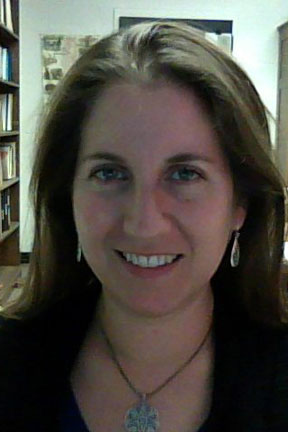 Sadie Ryan, assistant professor of environmental and forest biology at the State University of New York-Empire State College, studies ecology at the human interface and its implications for conservation, sustainability, wildlife management, and disease ecology. Her interdisciplinary work incorporates tools from quantitative and applied ecology, geography and social science. She uses techniques from the lab to the field to the computer to the white board.
Sadie Ryan, assistant professor of environmental and forest biology at the State University of New York-Empire State College, studies ecology at the human interface and its implications for conservation, sustainability, wildlife management, and disease ecology. Her interdisciplinary work incorporates tools from quantitative and applied ecology, geography and social science. She uses techniques from the lab to the field to the computer to the white board.Ryan will present her paper “Beyond ecological success of corridors: Integrating land use history and demographic change to provide a whole landscape perspective” on Wednesday, Aug. 7 at 10:50 a.m. in L100D, Minneapolis Convention Center.
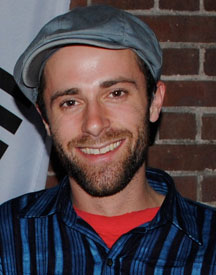 Stephen Wood, Ph.D. student in the Department of Ecology, Evolution, and Environmental Biology and the Tropical Agriculture and Rural Environment Program at Columbia University, studies two main issues: the effects of agricultural development in sub-Saharan Africa and how biological organisms interact to contribute to the functioning of ecosystems. He is interested in understanding the impacts of economic and political pressure to increase crop production on nutrient cycling, biodiversity and livelihood strategies and nutrition. In particular, he studies how farm management strategies associated with the African Green Revolution impact the composition and functional capacity of soil microorganisms, which control most aspects of nutrient cycling in terrestrial ecosystems and are crucial for the wellbeing of humans and nonhuman species. His research is conducted in the Millennium Villages Project sites.
Stephen Wood, Ph.D. student in the Department of Ecology, Evolution, and Environmental Biology and the Tropical Agriculture and Rural Environment Program at Columbia University, studies two main issues: the effects of agricultural development in sub-Saharan Africa and how biological organisms interact to contribute to the functioning of ecosystems. He is interested in understanding the impacts of economic and political pressure to increase crop production on nutrient cycling, biodiversity and livelihood strategies and nutrition. In particular, he studies how farm management strategies associated with the African Green Revolution impact the composition and functional capacity of soil microorganisms, which control most aspects of nutrient cycling in terrestrial ecosystems and are crucial for the wellbeing of humans and nonhuman species. His research is conducted in the Millennium Villages Project sites.Wood will present his paper “African Green Revolution interventions and the functional diversity of soil microbial communities” on Friday, Aug. 9 at 8 a.m. in 101J, Minneapolis Convention Center.
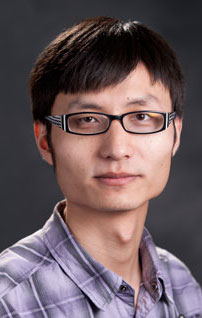 Wu Yang, Ph.D. candidate in the Department of Fisheries and Wildlife at Michigan State University, also is a member of the Center for Systems Integration and Sustainability. His broad research interests are in the field of sustainability science. He is interested in integrating multiple disciplines and techniques (e.g., ecology, socioeconomics, management, remote sensing, and system modeling) to study ecosystem services, human well-being, their linkages, and complexity in coupled human and natural systems. He also applies social psychological theories to understand the underlying mechanisms of conservation behaviors. He advocates for actionable science to shape policy making both for ecosystem services and human well-being. Based on the framework of Millennium Ecosystem Assessment, Yang assesses conservation and development outcomes from both the ecosystem services and human well-being perspectives by asking three sets of questions: For the past decade, what are the outcomes of both conservation and development policies and what factors determine such outcomes? How and to what extent different policies interact with each other? Based on understandings of the first and second sets of questions, what strategies would enhance the effectiveness, efficiency and sustainability of conservation and development policies? What strategies should be adopted to tackle the trade-offs and synergies between different policies to achieve both ecological and socioeconomic sustainability?
Wu Yang, Ph.D. candidate in the Department of Fisheries and Wildlife at Michigan State University, also is a member of the Center for Systems Integration and Sustainability. His broad research interests are in the field of sustainability science. He is interested in integrating multiple disciplines and techniques (e.g., ecology, socioeconomics, management, remote sensing, and system modeling) to study ecosystem services, human well-being, their linkages, and complexity in coupled human and natural systems. He also applies social psychological theories to understand the underlying mechanisms of conservation behaviors. He advocates for actionable science to shape policy making both for ecosystem services and human well-being. Based on the framework of Millennium Ecosystem Assessment, Yang assesses conservation and development outcomes from both the ecosystem services and human well-being perspectives by asking three sets of questions: For the past decade, what are the outcomes of both conservation and development policies and what factors determine such outcomes? How and to what extent different policies interact with each other? Based on understandings of the first and second sets of questions, what strategies would enhance the effectiveness, efficiency and sustainability of conservation and development policies? What strategies should be adopted to tackle the trade-offs and synergies between different policies to achieve both ecological and socioeconomic sustainability?Yang will present his paper “Interaction effects of multiple conservation and development policies” on Thursday, Aug. 8 at 4 p.m. in 101J, Minneapolis Convention Center.
Telecoupling featured at ESA Annual Meeting
Coupled human and natural systems gets an umbrella at August’s Ecological Society of America meeting.
The umbrella is telecoupling -- a natural extension of CHANS -- which spans over socioeconomic and environmental interactions over distances, pulling together new and powerful interactions between distances, such as trade, species invasions, human migration, direct foreign investment, and transnational land deals.
The symposium “Ecological Sustainability in a Telecoupled World” brings six sustainability scholars together Thursday morning to address fundamental global questions such as how different types of distant interactions enhance or offset sustainability at different locations, or how telecouplings may be facilitated to enhance sustainability.
Jane Lubc henco of Stanford University, Peter Gleick of Pacific Institute, Karen Seto of Yale University, Thomas Hertel of Purdue University, Joanne Gaskell of UC-Berkeley and Steve Davis of UC-Irvine, will present cutting-edge research projects that have taken innovative approaches to address complex issues in telecouplings and sustainability across different places.
henco of Stanford University, Peter Gleick of Pacific Institute, Karen Seto of Yale University, Thomas Hertel of Purdue University, Joanne Gaskell of UC-Berkeley and Steve Davis of UC-Irvine, will present cutting-edge research projects that have taken innovative approaches to address complex issues in telecouplings and sustainability across different places.
The symposium covers rapidly developing countries (e.g., China) and developed countries (e.g., the United States). It includes a diverse set of ecosystems (e.g., urban, agricultural) from around the world. Each speaker will present novel insights from a systems perspective and use the study to help consolidate the telecoupling framework.
The symposium is organized by Jianguo “Jack” Liu of Michigan State University with Harold Mooney of Stanford, and is moderated by Bill McConnell of MSU.
CHANS-Net events at 98th ESA Annual Meeting
CHANS-Net has organized a series of events at the 98th Annual Meeting of the Ecological Society of America (ESA) at the Minneapolis Convention Center, Aug. 4-9. The events will bring together CHANS-Net members, including the 2013 CHANS Fellows.
One or more working sessions tentatively is planned for Thursday afternoon, where issues raised in the symposium can continue and joint CHANS research/writing projects planned. Meeting space has been reserved at the Hilton Hotel, and discussion topics are welcome. For more information, or to suggest topics, contact chans-net@csis.msu.edu.
Schedule of CHANS-Net Events
Wednesday, August 7
- 9 a.m. “Landscape impacts of potential biofuel production scenarios in North Carolina,” M100HC; paper presented by 2013 CHANS Fellow Jennifer Costanza
- 10:50 a.m. “Beyond ecological success of corridors: Integrating land use history and demographic change to provide a whole landscape perspective,” L100D; paper presented by 2013 CHANS Fellow Sadie Ryan
- 11:10 a.m. “Spatial methods for low-cost restoration of rangeland ecosystem services,” L100J; paper presented by 2013 CHANS Fellow Andrew Rayburn
- 2:50 p.m. "Quantifying the upstream flux of phosphorus to Minnesota’s Twin Cities urban food-shed,” M100HC; paper presented by 2013 CHANS Fellow Heidi Peterson
- 4:40-6:30 p.m. “Characterizing hydrologic alternations following urbanization through time and across space among U.S. cities,” Exhibit Hall B; poster presented by 2013 CHANS Fellow Krissy Hopkins
- 7 p.m. Dinner, Hilton Duluth Room (Invitation only)
Thursday, August 8
- 8-11:30 a.m. CHANS-Net symposium: "Ecological Sustainability in a Telecoupled World," M100EF with presentations by Jane Lubchenco, Peter Gleick, Karen Seto, Thomas Hertel, Joanne Gaskell and Steve Davis.
- 10:40 a.m. “Telecoupled CO2 emissions: Implications of the growing dependence on internationally traded carbon,” M100EF; symposium presented by 2013 CHANS Fellow Steve Davis
- 11:45 a.m.-2 p.m. Speakers Luncheon (Invitation only), 3rd Floor, Director's Row 4 Room
- 2 - 5 p.m. Working sessions, 2nd Floor, Marquette IV Room
- 4 p.m. “Interaction effects of multiple conservation and development policies,” 101J; paper presented by 2013 CHANS Fellow Wu Yang
Friday, August 9
- 8 a.m. “African Green Revolution interventions and the functional diversity of soil microbial communities,” 101J; paper presented by 2013 CHANS Fellow Stephen Wood
- 8:20 a.m. “Designing a CHANS decision-support tool for harvest management of Great Lakes lake whitefish (Coregonus clupeaformis) in a changing climate,” L100D; paper presented by 2013 CHANS Fellow Abigail Lynch
The ESA 98th Annual Meeting program is available online.
Telecoupling pulls pieces of sustainability puzzle together
In June, 23 CHANS scholars from across the world published “Framing Sustainability in a Telecoupled World,” laying out a comprehensive telecoupling framework, using two conceptual examples: the growing trade of soybeans from Brazil to China and the red imported fire ant invasion. The piece was published in the online version of Ecology and Society.
For a world struggling to balance the needs of people and the environment in the face of critical challenges like climate change, food security, water security, energy security, environmental pollution, poverty, biodiversity loss and species invasion, Jianguo “Jack” Liu of Michigan State University, the paper’s lead author, says an integrated framework of telecoupling is essential.
“It has been traditional to focus on either the socioeconomic or environmental impact of an action,” Liu said. “But the lack of a holistic understanding of an action means that you really cannot manage a system well for both socioeconomic and environmental sustainability.”
Rocks, water, air, space…and humans: a recipe for AGU success
CHANS-Net has added a bit of spice to a geophysical scientist’s research recipe of rocks, water, air, space and life:
Humans.
At the 2013 Fall Meeting of the American Geophysical Union (AGU) a conference of nearly 20,000 Earth and space scientists, educators, students and policy makers, an international group of scientists made the case for adding the human element to their research.
The International Network of Research in Coupled Human and Natural Systems -- CHANS-Net -- is supported by the National Science Foundation’s Dynamics of Coupled Natural and Human Systems (CNH) program.
The CHANS approach means gaining a broader, more holistic understanding of the crucial questions of sustainability. Looking at ways for both the environment and people to thrive is at the core of CHANS research.
Bringing CHANS-Net to AGU -- Dec. 3-7, 2012 in San Francisco -- planted the seeds of ideas about ways to take research to a new level and offered help finding collaborators who can help open those doors.
"The AGU presentations that focused on coupled natural-human systems research gave geoscientists insights into the ways that social and behavioral science can complement biophysical science to give fuller, more complete, and more useful new insights into a broad range of environmental issues," said Tom Baerwald, NSF CNH program director.
To familiarize the AGU meeting attendees with the possibilities of coupling human and natural systems, CHANS-Net helped organize and support 11 oral and poster sessions that showcased examples of what can be achieved by casting a wider research net. There also was a town hall meeting called “Engaging with Coupled Human and Natural Systems” where attendees shared their experiences and challenges.
“For most traditional attendees at AGU, this sort of work has seemed unfamiliar, but we had many CHANS researchers there who made excellent cases why CHANS research is exciting and rewarding,” said Jianguo “Jack” Liu, principal investigator of CHANS-Net and Rachel Carson Chair in Sustainability at Michigan State University. “The AGU meeting has provided an outstanding platform to expand and diversify the CHANS community.”
At AGU, the strong tradition of networking continued, with CHANS fellows sharing experiences at dinner with guests such as Paul Ehrlich of Stanford University and his wife, Anne.
Surveys look at CHANS training, research questions
Two surveys are exploring the rapid evolution of CHANS research – one just launching and seeking participants, another coming to fruition.
At February’s CHANS-Net gathering at the American Geophysical Union Annual Meeting in San Francisco, CHANS-Net members and Fellows started looking for ways to identify the most compelling research questions that require a CHANS approach.
The product: A quick 10-question survey. An invitation will soon go out to CHANS-Net members. For questions about the survey and research, please contact Daniel Kramer, dbk@msu.edu. The results of the survey will be compiled, analyzed, published and shared with CHANS-Net members.
From an earlier survey, a paper in press with BioScience “The Elusive Pursuit of Integrative Interdisciplinarity: Perspectives from Researchers working at the Human-Environment Interface” is the result of a project undertaken by 2009 CHANS Fellows investigating how CHANS researchers are trained and how their training may influence their overall career path.
Authors are Eric Roy, Louisiana State University; Anita Morzillo, Oregon State University; Francisco Seijo, Middlebury College; Sheila Walsh, The Nature Conservancy; Jeanine Rhemtulla, McGill University; Jeffrey Milder, Cornell University; Tobias Kuemmerle, Humboldt-University; and Sherry Martin, Michigan State University.
CHANS-Net members gear up for AGU again
A group of CHANS-Net members are soliciting abstract submissions for two symposia at the the AGU Fall Meeting Dec. 9-13 in San Francisco.
The Global Environmental Change session “Adaptation of Smallholder Farmers to Climate Variability in the Tropics” (session GC017) is being convened by Meha Jain, a 2012 CHANS Fellow, Ruth DeFries, a CHANS-Net advisory board member, and Pinki Mondal, all of Columbia University, and Gillian Galford, of the University of Vermont.
Description: Climate change is predicted to negatively impact agricultural productivity across most of the tropics, where smallholder agriculture is the main livelihood for the majority of rural populations. Current models may over-estimate the impact of climate on agricultural production, however, given that farmers may adapt cropping practices that are better suited to novel changes in climate.
They invite submissions that examine observations of climate and agricultural management at local, regional, and national scales, so that any commonalities can be identified in factors that enhance the ability of farmers to adapt and reduce their vulnerability to changing climates.
Abstracts can be submitted here.
"Observational Networks of Mountain Social-Ecological Systems" focuses on data capture and integration relative to social-ecological systems in mountain regions. Mountains concentrate critical economic resources (particularly water), are extremely dynamic, and exist within a wide variety of institutional settings. Informed management of such coupled systems requires accurate and integrated data on the state and dynamics of both the social and ecological sub-systems.
Contributions are welcome from any region in the world, especially if using observational networks on biophysical features such as climate, hydrology, and ecology, or on social features such as demography, economy and governance, and on ways to combine them to quantify the functioning of coupled human-natural systems.
Confirmed speakers include Julio Betancourt and Dave Schimel.
Deadline: All abstract submissions must be received by Aug. 6.
A mountain of a scientific confab in Minneapolis
Three reasons to register now for the Key Contact Workshop of the Mountain Research Initiative, Saturday, Aug. 3.
Why should you join the MRI pre-conference workshop for scientists working in mountain regions?
- Your colleagues: to meet ecologists who are interested in mountains.
- Your work: to discuss your research focus and your ideas.
- Your palate: to enjoy really good food.
The meeting, just before the Ecological Society of American Annual Meeting, will be at the Minneapolis Mill City Museum.
The workshop offers a setting that stimulates interdisciplinary thinking and allows peers to take a fresh look at each other's research.
To register:
- Email mri@giub.unibe.ch with a simple “yes” attaching a digital photo of yourself.
- Go to the online form to fill out your research summary.
Deadline for registration: July 18.



 Print
Print Email
Email